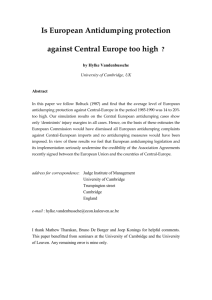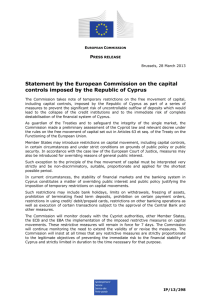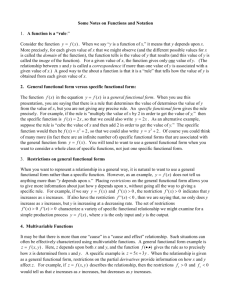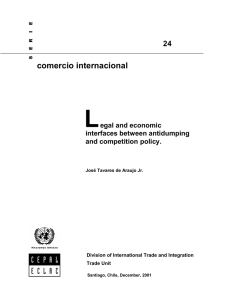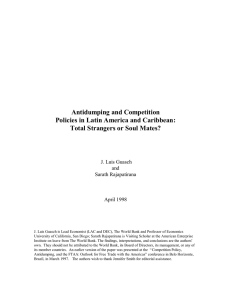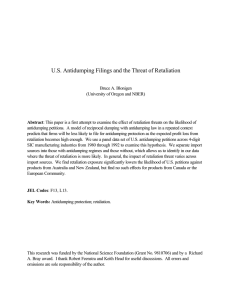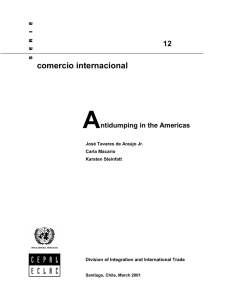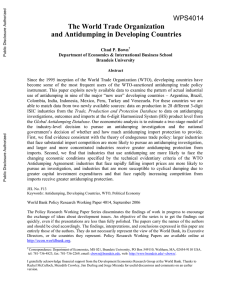Trade and Competition in the Asia Pacific Region
advertisement
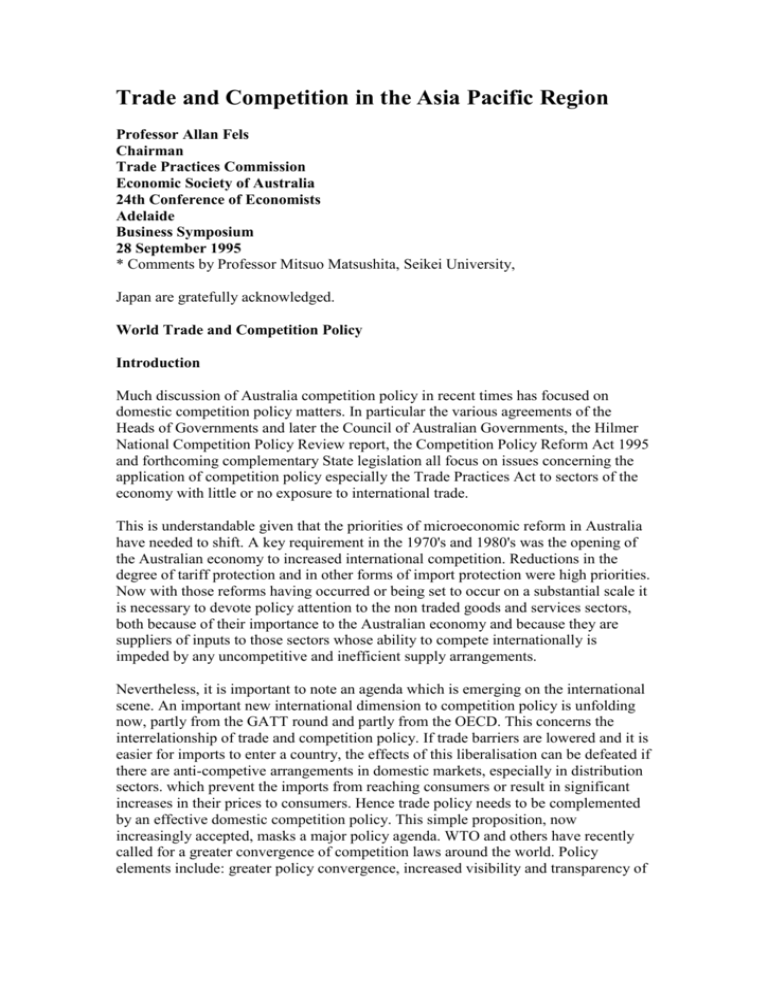
Trade and Competition in the Asia Pacific Region Professor Allan Fels Chairman Trade Practices Commission Economic Society of Australia 24th Conference of Economists Adelaide Business Symposium 28 September 1995 * Comments by Professor Mitsuo Matsushita, Seikei University, Japan are gratefully acknowledged. World Trade and Competition Policy Introduction Much discussion of Australia competition policy in recent times has focused on domestic competition policy matters. In particular the various agreements of the Heads of Governments and later the Council of Australian Governments, the Hilmer National Competition Policy Review report, the Competition Policy Reform Act 1995 and forthcoming complementary State legislation all focus on issues concerning the application of competition policy especially the Trade Practices Act to sectors of the economy with little or no exposure to international trade. This is understandable given that the priorities of microeconomic reform in Australia have needed to shift. A key requirement in the 1970's and 1980's was the opening of the Australian economy to increased international competition. Reductions in the degree of tariff protection and in other forms of import protection were high priorities. Now with those reforms having occurred or being set to occur on a substantial scale it is necessary to devote policy attention to the non traded goods and services sectors, both because of their importance to the Australian economy and because they are suppliers of inputs to those sectors whose ability to compete internationally is impeded by any uncompetitive and inefficient supply arrangements. Nevertheless, it is important to note an agenda which is emerging on the international scene. An important new international dimension to competition policy is unfolding now, partly from the GATT round and partly from the OECD. This concerns the interrelationship of trade and competition policy. If trade barriers are lowered and it is easier for imports to enter a country, the effects of this liberalisation can be defeated if there are anti-competive arrangements in domestic markets, especially in distribution sectors. which prevent the imports from reaching consumers or result in significant increases in their prices to consumers. Hence trade policy needs to be complemented by an effective domestic competition policy. This simple proposition, now increasingly accepted, masks a major policy agenda. WTO and others have recently called for a greater convergence of competition laws around the world. Policy elements include: greater policy convergence, increased visibility and transparency of policy convergence, improved cooperation between agencies, and an end to special treatment in home countries of export and import cartels. On the other hand, it needs to be recognised that much of trade policy in the world economy restricts competition and thereby deprives consumers of major benefits. There is much to be said for applying the general principles of competition policy to the area of trade policy and for approaching trade policy from the same perspective as competition policy. A development between Australian and New Zealand in this regard has attracted some international interest. This is the replacement of the antidumping laws between the two countries with the application of s.46 of the Trade Practices Act and s.36 of the Commerce Act. This means that dumping issues are now treated in the same manner as competition issues, an outcome likely to be more conducive to economic efficiency and favourable consumer outcomes. More generally, there is a discernible trend on the part of leading world economists and key policy makers to try to characterise trade policy as a form of competition policy, as requiring the application of the same principles (and even processes) in the interests of world economic progress. Formulation and implementation of this ambitious approach is a substantial world policy challenge. This paper discusses some issues concerning interaction of trade and competition policy. Restrictions on trade In this section of the paper we focus on some economic dimensions of the subject and consider various classes of restrictions on international trade. Government restrictions on trade The trading of goods and services internationally can be hindered by governments in a number of well known ways, including: o o o o o o o o import restrictions protective tariffs parallel import restrictions (under intellectual property law) countervailing duties non-tariff barriers in the form of standards and technical requirements government procurement policies voluntary export restraint agreements voluntary import expansion agreements It is worth singling out one class of restriction for particular attention since it has received insufficient discussion in international policy deliberations. This is the restrictions on parallel imports imposed under intellectual property laws. These have widespread effects on international trade. In the copyright area it is not possible for example for retailers in most countries to import for the purposes of resale books, records, computer software, pharmaceuticals, farm chemicals, and some other chemicals without the approval of the holder of the copyright in the importing country. This approval is rarely given. This enables there to be substantial price discrimination between different countries. There are some similar restrictions in areas of patent and trademark law. These are particularly important for high technology goods and they apply to a wide range of branded goods ranging from items such as handbags, perfume and high value branded foods, eg cheeses. Whilst it is not easy, briefly to summarise the law in the area of patents and trademarks, the restrictions are quantitatively significant. This is a somewhat obscure area of economic policy making, partly because policy making and intellectual debate has largely been captured by the intellectual property law users and by producer interests. Economists have taken relatively little interest partly because of the complexity of the law and its surrounding mystique. Generally, government imposed trade barriers restrict competition in world markets. Few would survive if the principles applied in domestic competition policy were applied to evaluate them. This is one aspect of the relationship between trade policy and competition policy. Government imposed restrictions on trade are the subject of international trade negotiations between governments in the World Trade Organisation (WTO) and many other fora. Whilst trade policy is a difficult area politically, the administrative and legal implementation of trade liberalising decisions is relatively simple, since governments generally have only to remove or quantitatively reduce barriers to free trade. Private restrictions on trade A second impediment to trade occurs if restrictive private business practices prevent or hinder traded goods and services from reaching consumers. This is especially likely if there is an ineffective or non-existent domestic competition policy. An example would be if a country reduced import tariffs for a particular good but there was a restrictive agreement in the home market between local manufacturers and local retailers under which local retailers did not accept imports for sale. Consumers would thereby be unable to purchase the imports. Of course, it might be that entry into the distribution sector would be easy in a particular instance and in that case the restrictive agreement would have no real impact on competition nor on the availability or price of goods and services to consumers. Nevertheless, under certain circumstances the restrictive agreement could distort the flow of goods and services to consumers (and would be likely to be in breach of a conventional effective domestic competition policy). This restrictive agreement may have consequences for trade policy itself if there are claims of unfair market access policies in the importing country and this generates retaliatory trade restrictions in the exporting country, e.g. a strengthened anti-dumping regime (which in turn may generate voluntary export restraints and so on). A further example would be if, in a home market, there were a domestic cartel in a traded good, e.g. steel. Supposing that steel producers were allowed to collude and to raise price; this might generate excess capacity in the home market and lead to dumping in overseas markets with damaging effects on the trade of the country which imports the dumped goods or competes with them in its export markets. This in turn might lead to the strengthening of the dumping laws in the importing country. Further examples of private hindrances to international trade in goods and services are export and import cartels. If exporters of a particular product can collude to restrict output and raise price, this will hinder the flow of international trade compared with the outcomes in a truly competitive market. An example is the OPEC cartel. In addition, in a single country which accounts for the larger part of world trade in a particular commodity and in which there are entry barriers in other countries, e.g. limited access to raw materials, a cartel may also cause prices to be higher than otherwise and impede the flow of trade compared with a competitive situation. Import cartels are a further source of restriction on international trade. The importers in a particular country, or even across a range of countries, may collude to force down the price of imports. In most countries there is a different treatment of export cartels compared with cartels supplying the home market. Most countries have softer treatment of export cartels and do not enforce competition law against them, or only do so in a very limited way, mainly where the impact is on the home market. (In some jurisdictions, eg Japan, there is also a different relatively lenient treatment of import cartels and they can be exempted under national antitrust law providing they face export cartels.) Export cartels can give rise to import cartels and vice versa. A well known example concerns US exports of woodpulp. Under the Webb Pomerene exemption for export cartels in US antitrust law, the exporters of woodpulp were able to collude. In response Japanese papermills formed an import cartel to boycott the American woodpulp production. The American woodpulp producers then sued the Japanese importers in the Daishowa Case, 1982. The Japanese importers argued in the American court that as long as the US export cartel was exempted, the Japanese import cartel should also be exempted. The outcome in essence was that the US court held that under US law only the export cartel was exempted and not the Japanese import cartel. Incompatibility of different regulatory/business systems As globalization of the national economies progresses, new trade issues will arise. An important issue concerns the incompatibility of different regulatory/business systems among trading states. Differences in domestic regulatory systems and in business customs and behaviour emerge as barriers to transnationalised business activities. Differences in regulatory schemes about technical standards, taxation, environmental protection measures, labour standards and other fields create barriers to enterprises when they seek to do business across boundaries. Such differences cause disparity among different states in the conditions in which enterprises engage in business activities. This is true not only in governmental regulation of business activities but also in business customs and corporate behaviour. For example, if business customs in a trading nation are different from those in others, they may be an impediment to trade. Claims have been made by the governments of the United States, the European Union, as well as by business enterprises, that long term business relationships among Japanese enterprises, so-called "keiretsu" systems (closely interconnected relationships among enterprises through formal and/or informal relationships) and mutual stock-holdings among corporations are, among others, trade barriers. In the era of a fast globalizing economy in which govermental barriers are less and less important, such differences in business customs and corporate behaviour acquire an increasing importance as impediments to trade. This is an issue of a conflict or incompatibility of business systems. Business systems, of course, are rooted deeply in the political, economic and cultural traditions of the nations and differences of business systems cannot easily be dissolved. It is also necessary to preserve diversity in business cultures of different nations and, in this respect, it is not only impossible but also undesirable to attempt to unify them. However, faced with a fast shrinking world in terms of international business activities, it is necessary to reduce incompatibility of different business systems so that such differences do not cause undue difficulties for enterprises when they enter into each other's national markets. This calls for a partial harmonization of business systems among trading nations. In the European union in which governmental barriers such as tariffs and import restrictions were removed, competition policy measures play a vital role in ensuring that the common market operates without hindrances by private restrictive business practices. In the European Union the role of competition policy has increased dramatically as integration of the common market has progressed. In the Structural Impediment Initiative (the SII) negotiated between the United States government and the Japanese government in 1989-90, business customs and corporate behaviour among Japanese companies were the major issues. The United States government claimed that restrictive business customs and corporate behaviour were the major impediment which restricted effective market access to the Japanese market by foreign enterprises. In the SII, both governments agreed that an intensification of competition policy in Japan would increase market access to the Japanese market by foreign enterprises by removing private restrictive business practices. A number of reforms of the Japanese Antimonopoly Law resulted from this agreement including increases of administrative surcharges and criminal fines to be imposed on enterprises when they engaged in cartels. As mentioned before, differences in business customs and behaviour are rooted deeply in the history of the state and, even if they are barriers to transnational business activities, they are generally far more wide ranging and complex than the application of competition rules can possibly solve. However, a vigorous enforcement of competition rules in trading nations can play a useful role in preparing the common rules of conduct for enterprises and reducing undue imbalances in different business systems. This paves the way for enterprises to compete for roles in markets of the trading states through superior efficiency and effort. Issues described above with regard to the European Union common market and the SII are also issues that the World Trade Organisation (WTO) must deal with. The WTO is aimed at liberalizing trade in the multilateral trading system. It may not be as complete as the common market in the European Union. However, the underlying principles should not be so different. Although there are more exceptions to the principle of free trade under the WTO than there are in the European Union such exceptions will be reduced in due course. Therefore there will be a greater need to increase the application of competition rules in the framework of the WTO in order to maintain the effectiveness of the system through ensuring market access among the member states. Market access There has been much debate in recent times about how weaknesses in domestic competition policy may hinder international trade. Some label this as the problem of "market access". Other critics say that this concern is greatly exaggerated. An inability to gain access to domestic markets should not necessarily be equated with weaknesses in domestic competition policy. There are many other reasons why imports may not succeed in breaking into domestic markets, eg local preferences for local goods. Restrictive practices in the home market can be overcome if there are low entry barriers, eg if there are restrictive practices in distribution it still may be easy for an importer to set up its own distribution channels. Also, certain restrictions that are complained about might not be breaches of the domestic competition law of the exporting country. Moreover, there are conceptual problems with the notion of market access. Market access conceptually should not be confused with restrictions on competition, or freedom of entry into a market in particular. Is access a concept related to opportunity to compete and to enter a market or with the results of market entry? It is quite possible that there will be freedom of entry into a market but no actual access to consumers because of some deficiency in the product, for example consumers in the importing country do not like it. The discussion of market access problems by many trade negotiators has been based on a deficient understanding of competition concepts. (Australia appears to have been mercifully free of this deficiency.) Legal issues As is apparent from the preceding section of this paper, conduct which occurs outside the territorial limits of jurisdiction may affect competition and, more generally, economic performance within a country. Multinational enterprises in particular may be hard to govern on the basis of the normal application of the law of a nation state. There is no international system available to regulate this kind of conduct. Therefore, one approach would be if the countries in which the possible offences occurred prohibited them, but it is a fact of life that the countries tend not to take action against any competitive conduct that merely affects other countries. The political incentives are all against this and in fact most countries explicitly exempt such behaviour. If they did have laws applying in this manner there would still be a doubt as to whether enforcement agencies would apply scarce resources in dealing with these problems rather than ones affecting the home market. Another policy solution is to apply extraterritorial legislation. This in fact happens. In the United States, the European Union, Germany and Australia for example, competition rules are applied to the conduct of foreign enterprises in a foreign state that affects the domestic market. In principle there is quite a strong case for the application of extraterritorial legislation in this manner. If effective it tends to eliminate competitive conduct and thereby, on a world scale at least, to improve efficiency of resource allocation. From a legal, political and administrative perspective, however, there are difficulties with extraterritorial laws. First they must be applied to behaviour which occurs outside a territory of a sovereign state and with regard to behaviour occurring in another sovereign state. Second, competition law enforcement is a fact-intensive discipline. It is not just a matter of discovering whether or not there is a law that restricts competition. In competition matters it is normally necessary to analyse the total economic environment before reaching a conclusion about behaviour and this is especially difficult if an agency or Court is investigating behaviour in another country. Consequently, there are very considerable administrative and operational problems, for example regarding discovery, conducting proper investigations, requiring the attendance of witnesses that, are all difficult, if not impossible to overcome. Third there may be blocking legislation such as Australia enacted in the Westinghouse case. Further, another difficulty would occur if the behaviour occurs in more than one country at a time. Accordingly, policy has to consider cooperative approaches. Cooperative approaches to dealing with the interaction of Trade and Competition Law In this part of the paper we discuss co operative approaches to dealing with the interaction of trade and competition law. The first approach is sometimes labelled "the convergence approach". This usually starts from a recognition of the fact that most countries do not have competition policies. Also those that do may not enforce them very seriously. Against this background there are two steps usually considered; the first is that there should be certain fundamental principles adopted in each nation's competition law. The second is that there are certain enforcement requirements to give effect to these principles. Regarding the principles, it is possible to devise a general kind of model code of antitrust law. Something like this has been encouraged by international agencies like the OECD, the World Bank and so on as part of their programs to assist countries interested in adopting competition policies; this includes East Europe. Not all countries can agree on the adoption of a comprehensive competition policy modelled on, say the North American approach. However, certain minimum basic or fundamental principles can be agreed upon in these circumstances. That is, almost any antitrust law would include a prohibition on cartels, on resale price maintenance and generally on anticompetitive boycotts. In this area there is wide agreement. Areas where there is much less agreement concern the treatment of vertical relationships, including vertical trade restraints. There are wide differences of opinion on how seriously these should be treated. In European law, which has been heavily influenced by the European Union's wish to promote trade within the Union, heavy emphasis has been placed on opposing many vertical restraints which would be acceptable in the United States (which has generally had a more lenient policy to vertical relationships). Another controversial area concerns merger policy. For example in the United States the approach is to prohibit anticompetitive mergers; in Europe a more neutral attitude is taken on mergers and if there is a sufficient public benefit they may be allowed even if anticompetitive. Arguably differences in merger policy criteria are not a source of significant trade restrictions. Yet another area of policy disagreement concerns industry policy (which may get tied in with competition policy questions, eg in the treatment of mergers). Another set of issues concerns the area of MFN, most favoured nation, approaches. Generally a strong case can be made for the adoption of the approach that any competition law should not treat one nation better or worse than any other. Moreover, there should be equal national treatment principles, that is foreigners should be treated in the same way as domestics. Turning to the procedural and enforcement side, the processes should be adequate; for example, there should be some independent consideration and evaluation of matters rather than decision making by politicians. Second, there should be due process in the sense that every party which may have breached the law should have the right to a hearing and generally a judicial review of decisions. Thirdly, there are issues concerning appropriate penalty regimes; they need to be adequate to deter. There are, however, wide differences in penalty regimes around the world. The United States, for example, has criminal penalties for price fixing, whereas Europe and Australia do not. A further difference concerns the right of private action which broadly does not exist under European Union law but does in the United States, Canada, Japan and Australia. Also, levels of penalty can vary widely. Yet another dimension is the actual administrative application of the law. The laws of some countries appear entirely satisfactory in terms of the enactment of the law. However, the enforcement agency may or may not be vigilant in its enforcement. This leads in turn to demands for transparent application of the law with published data indicating levels of fines and penalties imposed during the year, numbers of investigations, and so on. The issue of convergence is significant because competition policy laws are now being adopted in quite a few countries. For example, in Asia in very recent years, many countries have seriously considered the introduction of antitrust laws for the first time. These include China, Mongolia, Vietnam, Thailand, Malaysia. Indonesia is also considering the matter. There are of course already significant antitrust laws in Japan, Korea, Taiwan, and India. East Europe and the CIS have adopted significant antitrust policies. The reasons for this adoption include greater awareness in these countries of the benefits of competition policy, and some pressures from trade partners and from international agencies such as the World Bank. The next broad set of issues concerns possible cooperation between different countries. The possibilities here include: o o o o o o o o Information exchange between enforcement agencies Positive comity. This entails seeking the foreign government to act on behaviour in its country which is damaging to the economy of another country (to be distinguished from negative comity which means the opposite, that is that the country does not apply the law where the behaviour merely damages another country). Mutual recognition of antitrust judgements, eg damages decisions. This involves recognition of judgements and enforcement of them in other countries. Treating as null and void antitrust violations. This means that if there is a contract in a country which involves an antitrust violation in that country, any contractual arrangements from it should be regarded as null and void in another country. Cooperation agreements. These agreements may be between countries and/or enforcement agencies. There may be on a bilateral basis or on a plurilateral. There may even one day be a universal agreement. OECD. The OECD plays some role in bringing about agreements between countries on information exchange. However the main significance of the OECD Competition Law and Policy Committee is that is a forum for debate about the principles of competition policy and is a force making for convergence. It sets the actual framework for some aspects of competition policy around the world. A World Competition Law. It is sometimes proposed that a world competition law enforced by some world tribunal is needed. This idea lies some way off. WTO. A further possibility is that the WTO should adopt some kind of competition law and be the enforcement agency. Anti-dumping There has been a great deal of research on antidumping law indicating that only a few of the decisions made under antidumping law are compatible with the principles of competition policy normally applied domestically in a country. For example under competition law, there are some restrictions on predatory pricing but very few of these would prevent pricing which fails the requirements of dumping law. Dumping law fails most competition policy tests. What should be done in this situation? The options are first to "dump" antidumping law and simply leave the matter to competition policy. Something like this has occurred between Australia and New Zealand when they abolished the antidumping law between the two and left any matters to be resolved by the application of the market abuse powers under Sections 46 and 36 of their respective Anti Trust laws. Another option is to modify current anti-dumping law to take on board more of the principles of competition policy. A third option is to simply have more dialogue between competition policy and dumping policy agencies. This is an area in which there would be a high benefit to further study of the problem. For example, the concepts used in antidumping law and competition policy could be compared; for example, the concept of a market used in an anti-dumping case is quite different often from that used in a competition law case. Concepts like constructed price in antidumping are also highly problematic under competition law. On the other side it must be recognised that dumping law has slightly different objectives from competition law and whilst this imparts a more anticompetitive flavour to antidumping laws, there may be some special trade policy considerations that would lead one to take a slightly different view of antidumping law than competition law. However, in an ideal economy antidumping law would be no different from a misuse of market power law applied under competition policy. It is worth noting that if competition laws are not harmonised there is a great risk that dumping will occur or will be thought to occur and this will stimulate the introduction or intensification of antidumping laws. Some policy options are: o o o o o To establish consultation procedures between competition law authorities and antidumping law authorities. To introduce the concept of predatory pricing and the enforcement of antidumping legislation. To take into account the idea of requiring that the market of the export nation is closed to import due to government restrictions or private restrictive business practices in evaluating dumping situations. To introduce a "meeting competition" defence. To introduce the "public interest" requirement and the enforcement of antidumping legislation. Other areas of interaction are: o o Intellectual property law, competition law and trade law. Industry policy, industry state subsidies and government assistance to industries. Australia I finally turn to some issues concerning Australian Competition Policy and its relationship to international competitiveness. It is sometimes suggested that Australia's merger policy may impede the achievement of economies of scale necessary for international competitiveness. Few if any specific cases are cited in this regard. One reason is that few such mergers are likely to be found anti-competitive. Typically firms seeking to compete in international markets are subject to import competition in the Australian market. The Commission has not objected to any mergers in the last four years where there has been import competition. Moreover, even if the merger is anti-competitive, Australia's distinctive authorisation process allows mergers to occur if the parties can demonstrate to the satisfaction of the Commission and on appeal the Tribunal that the public benefit exceeds any detriment to competition. However, assertions that mergers will contribute to international competitiveness are not automatically accepted. Arguments about national champions have been discredited in recent years. Porter's view that competitiveness in a domestic market is the key to success in international markets also deserves consideration. Firms proposing anti-competitive mergers must positively demonstrate the value of their merger. A recent example of failured argument concerns CSR proposed joint venture with MacKay Refined Sugar. One should not view merger policy negatively. It makes a positive contribution to Australia's international competitiveness by ensuring competitive and efficient supply conditions in many industries and hence leads to lower input costs for exporters and import competing businesses.
